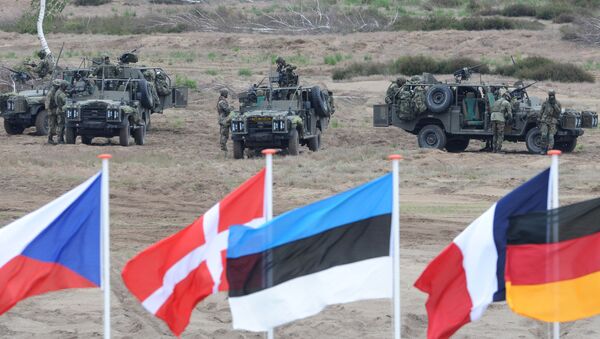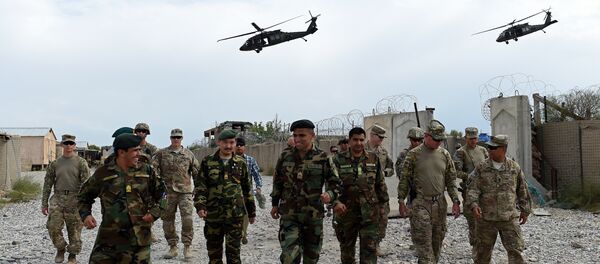Twenty-seven years after the fall of the Berlin Wall, NATO's Cold War rhetoric has caught a second wind; defense ministers of the 28-member organization have agreed to beef up the Alliance's "forward presence" in Eastern Europe, US author Jonathan Marshall notes.
"Worse yet, NATO's provocative commitment will include a potential threat to start World War III on behalf of that government. Most Americans are unaware that NATO's policies — reaffirmed by the Obama administration — view nuclear weapons as a 'core component' of the alliance's capacity to repel even a conventional attack on one of its member states," Marshall writes in his article for Consortiumnews.com.
Back in 2010 political leaders from Belgium, Germany, Luxemburg, The Netherlands and Norway urged the NATO leadership to remove US nuclear weapons from European soil.
"US military leaders were inclined to agree. In 2008, the US European Command, once a champion of theater nuclear weapons, acknowledged they were no longer important as a deterrent. When asked in 2010 if tactical nuclear weapons in Europe bought NATO any additional security, General James Cartwright, vice chairman of the Joint Chiefs of Staff, declared simply, 'No'," Marshall continues.
However, US hawks and influential American defense contractors cannot leave the Cold War behind.
The demonization of Russia and Cold War-style hysteria around Moscow's non-existent plans to take over the Baltic states serve as a pretext for increasing the Pentagon and NATO military spending.
Irish freelance journalist and media analyst Danielle Ryan echoed Marshall's concerns in her February op-ed for RT.
"This happens every time the Pentagon wants more money to play with. Various 'studies' about the danger posed by whichever bad guy is in fashion start appearing. Experts suddenly realize that the US military is drastically underfunded in said area of immediate strategic importance. Officials begin making even more outlandish statements than usual. And the media eat it up, apparently completely unaware of the fact that they are being taken for a ride," Ryan pointed out.
.@MFA_Russia spox Maria Zakharova on BBC's 'mockumentary' about Russian invasion of Latvia https://t.co/0uhSd9Ab68 pic.twitter.com/9kxqOsLgQM
— Danielle Ryan (@DanielleRyanJ) 17 февраля 2016
Marshall explains that Russia's military doctrine "firmly envisions using nuclear weapons only as a last resort," that can be used only to respond to a nuclear attack or withstand foreign aggression that would pose an existential threat to the state.
In short, Russia is neither a menace to its European neighbors, nor a threat to US security.
Marshall cites Rep. Dana Rohrabacher, chair of the House Foreign Affairs Subcommittee on Europe, Eurasia, and Emerging Threats, who has recently denounced claims of Moscow's growing threat to Washington as "belligerent nonsense."
In her article for The National Interest, Rohrabacher emphasized that Russia could be a valuable American ally against mutual enemies. While maintaining a "defensive military posture second to none," she noted, Washington should cultivate beneficial relations with nations that have similar cultures and values.
Meanwhile, the Pentagon announced it will send six F-15s to Finland this spring for military drills that will take place about 100 miles from the border with Russia, CNN reported Monday, citing military officials.
"With the deployment of NATO troops right up to the border of Russia for the first time, we are on the verge of a reverse Cuban missile crisis. And with both countries bombing in Syria, anything could go wrong there too," Professor of International Law Francis Boyle told Sputnik in an exclusive interview.
It seems that the speech Vladimir Putin delivered at the Munich Security Conference in 2007 was prophetic: by expanding NATO eastwards and making the Middle East more unstable, Washington is undermining the world's security and betraying its own national interests.




